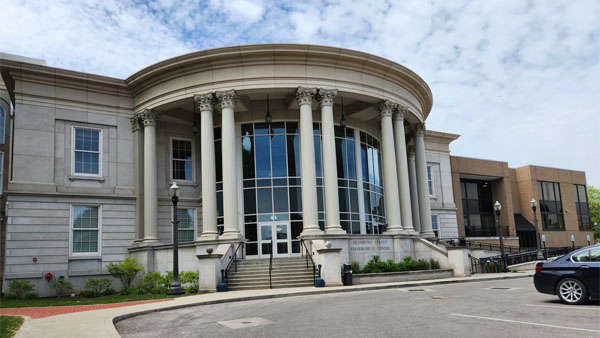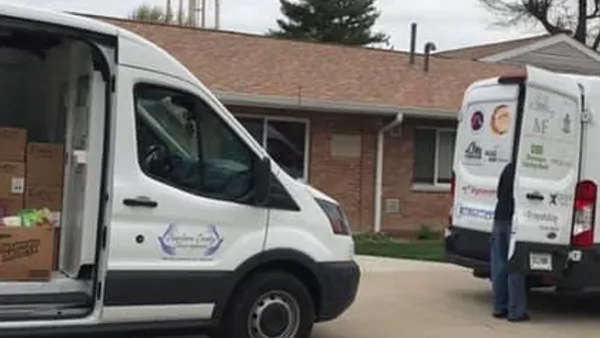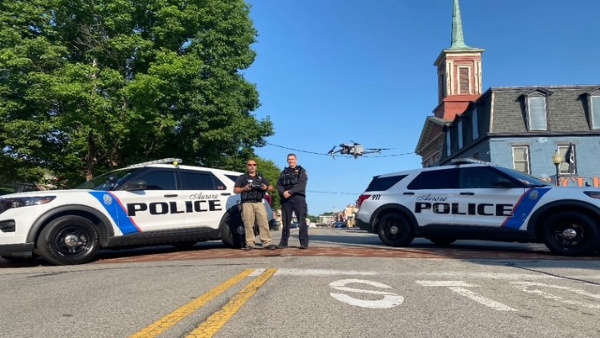By Mike Perleberg
State Rep. Jud McMillin (R-Brookville) will begin his duties as the House Majority Floor Leader when the 2015 legislative session begins Tuesday. Photo provided. (Indianapolis, Ind.) - A new two-year state budget is priority number one for Indiana’s state lawmakers as they get to work Tuesday. The 2015 legislative session begins Tuesday afternoon in Indianapolis and will continue through mid-April. “There are 150 difference legislators here and all of them have a different opinion on how we should spend the state money. It can always get a little dicey,” says State Representative Randy Frye (R-Greensburg), whose House District 67 extends from Greensburg to Aurora and Vevay. HEAR EAGLE 99.3'S INTERVIEW WITH STATE REP. RANDY FRYE IN THE AUDIO PLAYER BELOW. [audio mp3="http://eaglecountryonline.com/wp-content/uploads/2015/01/state-rep-randy-frye-2015-session-preview-01052015.mp3"][/audio] Following last November’s general election, Republicans possess even stronger supermajorities in the House and Senate. That could make House District 68 State Rep. Jud McMillin (R-Brookville) one of the more powerful lawmakers in the Statehouse with his new role as the House Majority Floor Leader. “I get to spend a lot of time at the microphone talking about the issues that are important to us in the caucus and make sure I’m advocating positions that I hope will be very beneficial to southeastern Indiana,” McMillin says. HEAR OUR INTERVIEW WITH STATE REP. JUD MCMILLIN IN THE AUDIO PLAYER BELOW. [audio mp3="http://eaglecountryonline.com/wp-content/uploads/2015/01/state-rep-jud-mcmillin-2015-session-preview-01062015.mp3"][/audio] The sticking point of the biennial budget negotiations is expected to be education funding – it makes up close to half of the state budget – specifically addressing the disparity in per student funding between city and country school districts. McMillin says for far too long urban schools have been receiving more state funding than their counterparts in rural Indiana. “Schools in our area suffer because of that. I understand that urban schools have some complexities that we have to deal with, but you just can’t convince me that it costs twice as much to educate a kid in Indianapolis as it does in Dearborn County, Franklin County, or Union County,” McMillin says. It remains to be seen how the funding will be leveled out. Frye says he will introduce legislation to reintroduce a grant program for school districts with 1,500 or fewer students. The program was eliminated in 2010. “I know Rising Sun Schools teachers have not had a raise in years. It’s unacceptable,” Frye says. State Rep. Randy Frye (R-Greensburg) addresses the audience at the Dearborn County Chamber of Commerce Pre-Legislative Luncheon on December 2, 2014. Photo by Mike Perleberg, Eagle 99.3. Indiana House Minority Leader Scott Pelath (D-Michigan City) said Monday that he wants to see the state establish separate funds for public and private education in order to increase transparency in school funding. Pelath says Democrats would also like to see the state expand its preschool and full-day kindergarten programs. House Democrats will also push for the elimination of textbook rental fees, an initiative by Indiana State Superintendent Glenda Ritz. Democrats Say They’ll Focus On Middle Class In laying out House Democrats’ legislative agenda on Monday, Pelath said his caucus will continue to help pass needed legislation, critique the work of the House majority, and provide alternatives that give Hoosiers a chance to judge the two parties’ competing visions for the state. “We need to refocus on our struggling middle class, so that consumers have more to spend in the marketplace, workers can afford to acquire the new skills demanded by employers, and every citizen has the opportunity to take part in a world class education system of lifelong learning that begins in pre-school and finishes when a worker acquires the skills needed for his or her final job,” said Pelath. Legislative priorities for Democrats include raising the minimum wage, ethics reform, and revising the process of redistricting. Redistricting controlled by Republicans in 2011 is viewed as a large reason the party now enjoys supermajorities in both the House and Senate. Casino Gaming Wishes Could "Collapse Under Own Weight" An issue germane to southeast Indiana in particular is casino gaming. Frye, whose district includes Rising Star Casino Resort in Rising Sun and Belterra Casino Resort & Spa in Switzerland County, says he’d support a proposal to allow Indiana’s riverboat casinos to become land-based gaming facilities. The idea – a wish for Rising Star – has already received a positive recommendation from an interim study committee of lawmakers. “If you talk to Hollywood (Casino Lawrenceburg), they may have a different opinion than Rising Star. But personally, I think it’s insane that we have them on a boat that doesn’t leave the dock. That they have to maintain the boat. I just think it’s crazy,” says Frye. Indiana’s 13 casino properties each have a list of wants which don’t always work well together. Horse track racinos in Shelbyville and Anderson want to be allowed to have live table games. Some are seeking lower admission taxes. Those like Rising Star want to be land-based. “Each one has something new that they need which makes it very difficult to get any legislation actually passed. When you have that many different interests pulling in different directions it’s tough to come up with the compromise that enough people can support to get a majority of folks to vote for it,” McMillin explains. Even if the legislature can pass a gaming bill, it could potentially be vetoed by Indiana Governor Mike Pence. The governor has been on the record stating that he supports the “status quo” in regards to gaming in Indiana. “A lot of the proposals that are on the table right now, it’s tough to make an argument that they are not expansion. If a lot of those things end up in a bill I could certainly see him vetoing,” McMillin warns. Religious Freedom Could Be Session's Divisive Social Issue It wouldn’t be session time without some controversy. A bill protecting businesses’ religious freedoms – including the right to deny services to homosexuals – might cause some heated debate. “We have stopped talking about who can marry whom, and we are the better for it,” says Pelath. “There is no need to stoke that debate again through the guise of addressing alleged ‘discrimination.’ These discussions are pointless and irrelevant and do nothing to address the issues that need to be handled by this body.” In 2014, the state legislature failed to pass a constitutional amendment banning same-sex marriages. Gay marriage is now permitted in Indiana after federal courts declared Indiana’s law limiting marriage to one man and one woman unconstitutional. Another bill filed by State Senator Travis Holdman (R-Markle) would allow state and local governments to contract with religious organizations, even if that organization limits hiring to individuals who adhere to their doctrine. Giving Governor More Control Over Other State Offices Another possible piece of legislation floated has been making the State Superintendent of Public Instruction an appointed position. Such legislation has been proposed by State Senator Jim Buck (R-Kokomo). While many states have the state education commissioner as an appointed position, in the Hoosier state the superintendent is elected by statewide vote. The well-documented squabbles between current superintendent Democrat Glenda Ritz, the largely Republican-appointed Indiana State Board of Education, and Pence’s now defunct Center for Education and Career Innovation nearly cost the state it’s waiver for aspects of the federal No Child Left Behind law last year. While saying he believes some state positions not constitutionally required should not be up for popular vote, McMillin said he doesn’t see the idea becoming a reality this year. “But I think it’s a lengthy discussion that needs to be had,” he says. The Indiana Attorney General and Secretary of State are elected positions that might also become governor-appointed in the future. Proposal To Let Pence Run For Governor And President At Same Time One bill, if passed, could allow any Indiana state lawmaker to seek election to federal office at the same time they are running for re-election for state office. Indiana Governor Mike Pence is a prospective GOP candidate for the White House in 2016. Pence has said he won’t make a decision on a run for the White House in 2016 until after the 2015 state legislative session. House Democrat leader Pelath said Monday that Pence should make a choice and run for one office or the other. Pelath said during a Monday briefing on House Democrats' legislative agenda that Pence needs "to make a choice" and run for one office or the other.
 Dearborn County Comprehensive Plan Public Workshop Planned for July 24
Dearborn County Comprehensive Plan Public Workshop Planned for July 24
 4th of July Celebrations in Eagle Country
4th of July Celebrations in Eagle Country
 Dearborn Co. 4-H, Clearinghouse Teaming to Fill the Van
Dearborn Co. 4-H, Clearinghouse Teaming to Fill the Van
 Former Washington Township Trustee Arrested for Theft and Official Misconduct
Former Washington Township Trustee Arrested for Theft and Official Misconduct
 Aurora Police Launch New Drone Program
Aurora Police Launch New Drone Program
 Prepping Future Chefs at Science Behind Cooking Camp
Prepping Future Chefs at Science Behind Cooking Camp













